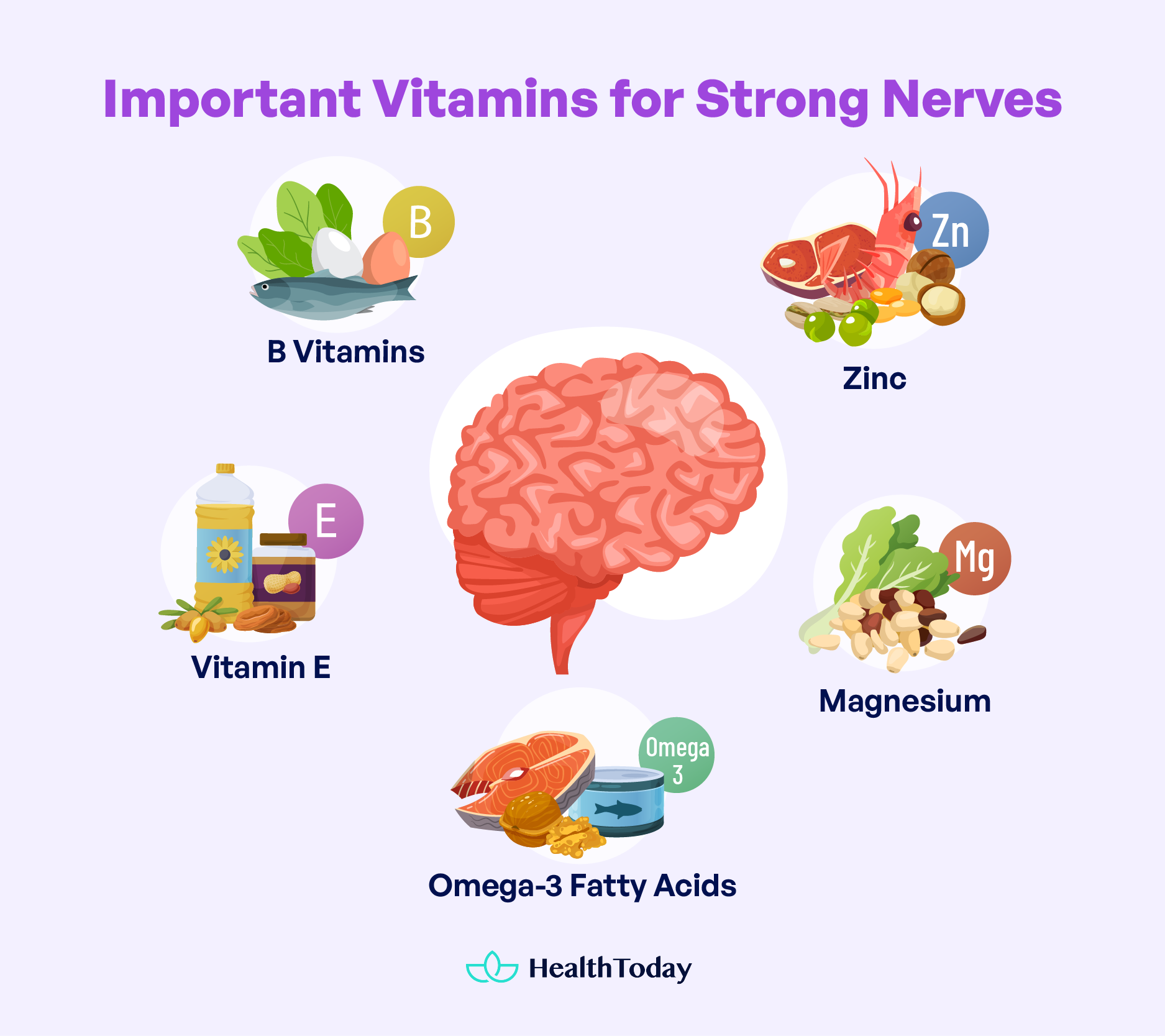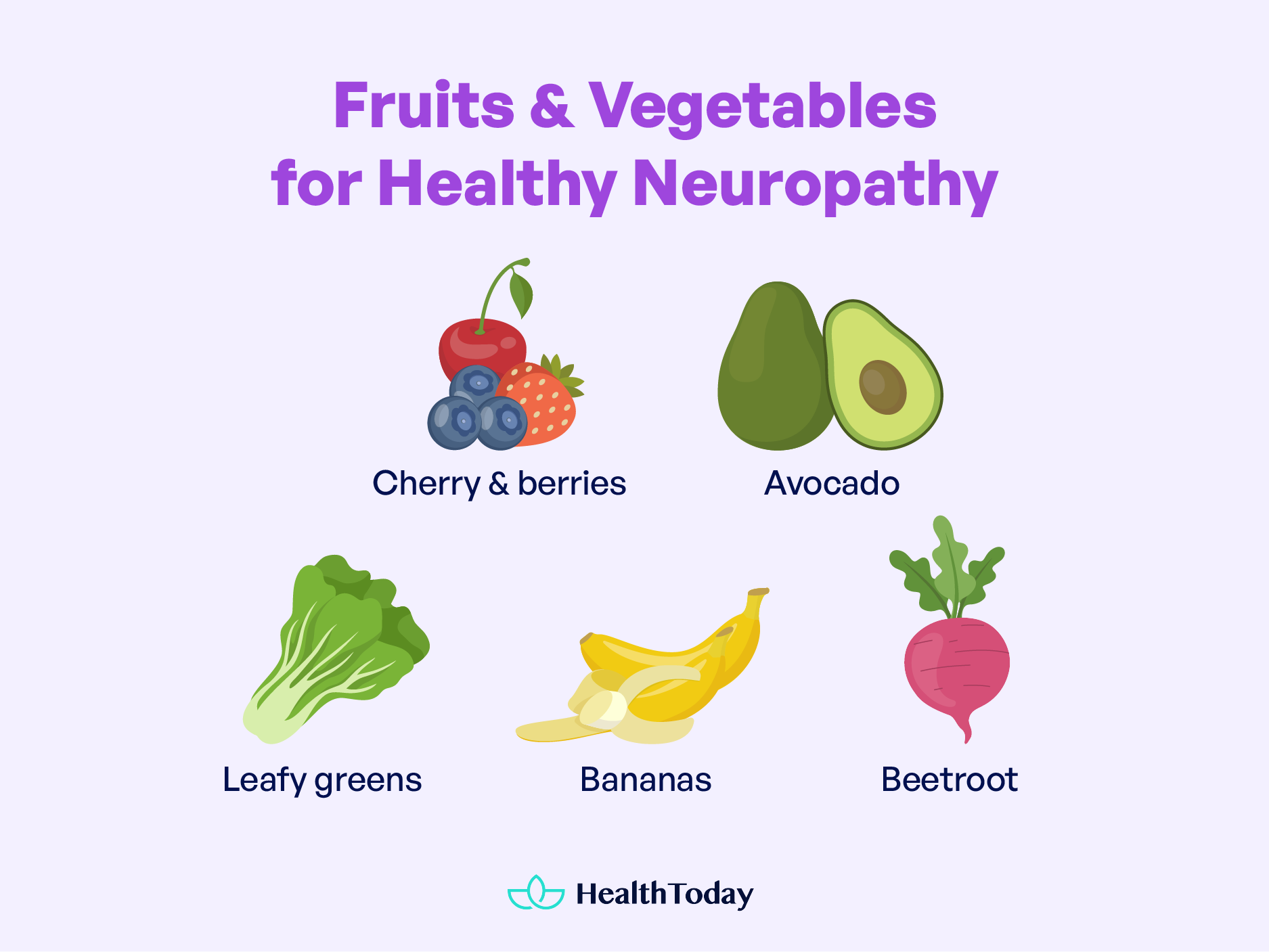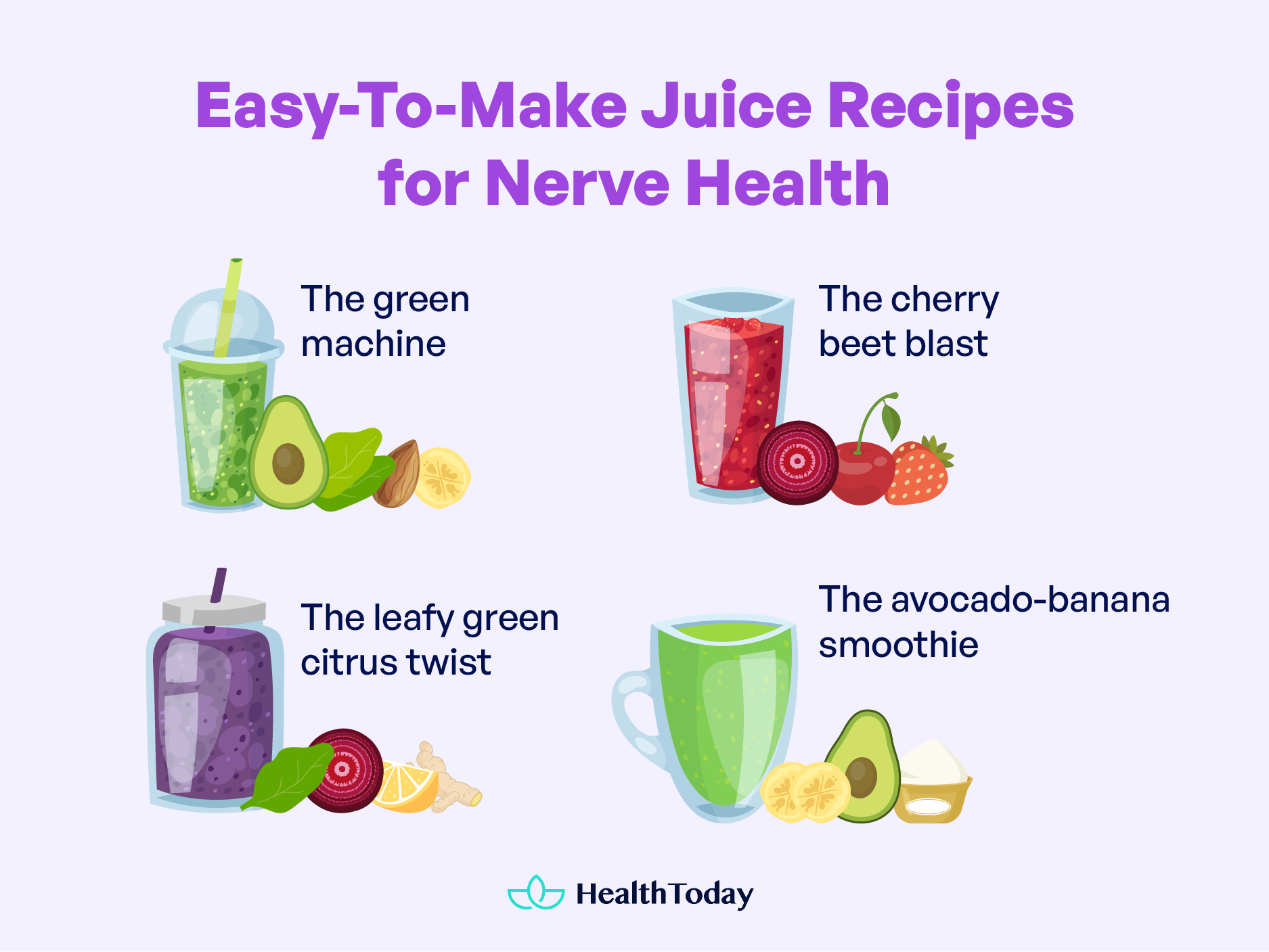Table of Contents
How can drinking juice help you improve your neuropathy? And which juice is good for nerves? That is what we will explain in this article. Whether you’re grappling with neuropathy, seeking to bolster your nerve health, or simply curious about the power of natural remedies, you’re in the right place.
This article isn’t just about listing the best juices for nerves; it’s an exploration of how what you drink can significantly impact your nerve health. From essential vitamins for strong nerves to delicious fruits and vegetables brimming with nerve-supporting nutrients, we’ve got you covered. Plus, we’ll touch on holistic approaches to managing neuropathy and improving overall nerve function. So, pour yourself a glass of your favorite juice, and let’s dive in.
Important vitamins for strong nerves: Things you should know
Before we delve into the specifics of each essential vitamin and nutrient for your nerves, it’s important to understand the broader picture. Think of your nervous system as this intricate web, a superhighway of messages zipping from your brain to every corner of your body. To keep this complex network working smoothly, it craves a variety of nutrients. They help maintain the fortitude of nerve cells and ensure messages don’t get lost in transit. So, let’s see how these essential vitamins and fatty acids keep your nervous system resilient and robust.

B Vitamins: Essential for nerve repair and maintenance
B vitamins are the heroes of your nervous system. Vitamin B12 is the guardian of your nerves; it’s essential for producing myelin, the protective sheath that covers nerves. Without enough B12, your nerves could get damaged, like when wires are exposed (1).
Vitamin B6 and B1 are equally important. B6 helps synthesize neurotransmitters, while B1 is key in maintaining healthy nerve cells (1).
Studies have shown that deficiencies in these B vitamins can lead to nerve dysfunction. For instance, a lack of B12 can result in peripheral neuropathy, a condition where nerves outside your brain and spinal cord get damaged (2).
You can find B vitamins in foods like eggs, poultry, fish, and leafy greens.
Vitamin E: A powerful antioxidant for nerves
Think of vitamin E as the bodyguard against oxidative stress, a process that can wreak havoc on your nerve cells. This vitamin protects your nerves from damage caused by free radicals – those pesky, unstable atoms that can mess with your cells and damage them (3).
Studies show vitamin E can protect your neurons from oxidative cell death more effectively than other substances (4).
The perks of Vitamin E go beyond just protection. Evidence suggests that this vitamin can slow down the progression of neuropathic conditions. It’s like a shield, safeguarding the integrity of your nerve cell membranes (5).
Nuts, seeds, and vegetable oils are quality sources of vitamin E.
Omega-3 Fatty Acids: Reducing inflammation and supporting nerve function
Omega-3 fatty acids have an incredible ability to dial down inflammation, which is super important for anyone battling nerve issues. Why? Because when nerves get inflamed, that’s when the trouble starts – pain, discomfort, and you name it (6).
There’s solid clinical evidence backing up the benefits of Omega-3s for nerve health. Studies have shown that people with various neuropathic conditions, like diabetic neuropathy or those pesky pinched nerves, can experience significant symptom relief by including more Omega-3s in their diet (7).
Furthermore, Omega-3 fatty acids help build your nerve cell membranes, ensuring your nerve cells communicate effectively (8).
Now, you might be wondering where to get these awesome fatty acids. Fatty fish like salmon, mackerel, and sardines are rich in Omega-3s. Flaxseeds, chia seeds, and walnuts are excellent plant-based sources. But do remember that plant-based sources only convert about 35% to the form of what’s needed in the body. So if you depend on them for Omega-3s, you’ll need to triple your intake from the plant sources.
Magnesium: Calming excited nerves
Magnesium is like a yoga instructor for your nerves, helping them relax and do their job without getting overly excited. When your nerves are too amped up, you feel the pain, such as nerve pain and those annoying muscle cramps.
Emerging research also indicates that magnesium might help in managing chronic pain, reducing anxiety, and improving outcomes after a stroke (9).
However, many of us don’t get enough magnesium. Studies suggest that a large portion of the adult population falls short in their magnesium intake. This shortfall can turn up the dial on nerve pain and muscle tension (10).
So, where do you find this magical mineral? Think leafy greens, nuts, seeds, and whole grains. They’re nature’s magnesium-packed snack bar.
Zinc: Supporting nerve health
Zinc is your nerve’s construction worker, which is critical in building and repairing nerve cells (11).
Furthermore, zinc is like the security guard for your immune system, which indirectly benefits your nerve health. A strong immune system means your body is better equipped to handle inflammation, a known troublemaker for nerves (12).
Dive into foods like meat, shellfish, legumes, and seeds. They’re not just tasty but loaded with the zinc your nerves crave.
Fruits and vegetables for healthy neuropathy
The colorful world of fruits and vegetables isn’t just a feast for the eyes; it’s a treasure trove of nutrients vital for neuropathy management and overall nerve health. Let’s explore how these fruits and veggies can be your allies in maintaining a healthy nervous system.

Cherry and berries
Cherries and various berries (blueberries, strawberries, raspberries) are packed with antioxidants.
Research has shown that berries, with their polyphenolic compounds, can fight off oxidative stress, help reduce inflammation, and improve nerve function, making them a great choice for those suffering from neuropathy (13).
Another research pointed out that 12 patients with nerve pain in their legs felt less pain after drinking 4 ounces of tart cherry juice twice a day for two weeks (14).
Avocado
Packed with monounsaturated fats, these green oval-shaped fruits are like the ultimate spa treatment for your nerve cell membranes. These fats keep the membranes supple and responsive, making sure your nerve cells are working smoothly and efficiently (16).
Avocados are also high in potassium. This mineral helps your nerves signal more effectively, which is crucial for everything your body does on autopilot, such as heartbeats, knee-jerks, and even those light-bulb moments (17, 18).
Leafy greens
Leafy greens like spinach and kale are powerhouses of B vitamins and magnesium, both important for nerve health.
B vitamins are crucial for nerve repair and health. They help in rebuilding damaged nerves and maintaining the nerve’s protective covering. Magnesium, on the other hand, is the mineral that keeps nerves calm and prevents overexcitation.
Besides, studies indicate that eating leafy greens regularly can slow your brain’s cognitive decline, which is an important part of your nervous system (19, 20).
Bananas
Bananas are not just a quick snack; they’re loaded with potassium and B vitamins, making them a superfood for your nerves.
Potassium is vital in nerve function, helping nerves send and receive signals more effectively. This mineral also helps you keep your blood pressure healthy (21, 22).
The B vitamins in bananas aid in nerve repair and can help alleviate neuropathy symptoms (23).
Beetroot
Beetroot is loaded with potassium, a key player in nerve signal transmission. Think of potassium as the electricity that keeps the communication lines between your nerves smooth and steady.
A study suggests that beetroot juice might help reduce muscle nerve activity, which could be useful for conditions where the nervous system is overly active (24).
Easy-to-make juice recipes for nerve health
Now that we’ve explored fruits and vegetables beneficial for nerve health, let’s dive into some delicious juice recipes to charge your day with a nerve-health boost.

- The Green Machine: Spinach, avocado, a banana, and a splash of almond milk.
- The Cherry Beet Blast: Beetroot, cherries, and a few strawberries for extra sweetness.
- The Leafy Green Citrus Twist: A handful of spinach, a small beetroot, one orange, and a slice of ginger for a zesty kick.
- The Avocado-Banana Smoothie: Half an avocado, one banana, and a bit of Greek yogurt for creaminess.
These juices can be diluted with ice cubes, aloe vera juice, water, or coconut water. You can add a teaspoon of green powder, turmeric, soy or sunflower lecithin, or other ingredients to make them even more potent.
Other ways to improve nerve damage: Natural remedies
While nutritious juices play a crucial role in supporting nerve health, there’s a whole world of natural remedies for you waiting to be explored. These remedies, which range from regular exercise to mindfulness practices, offer a holistic approach to improving nerve function and alleviating nerve damage.
Let’s take a peek at how these natural therapies can be powerful allies in your journey toward optimal nerve health.
Regular exercise
Exercise is like a superhero for your nerves. It boosts blood flow and carries oxygen and nutrients to your nerves, helping them work better and heal faster. Moving your body can also help to keep inflammation in check, giving your nerves a protective shield (25).
Plus, exercise is a great way to reduce stress. It loosens up the tension in your body, including your nervous system, allowing your nerves to take a well-deserved breather.
A short walk, swimming, or any other active activity can give your nerve health a boost.
Stress management
When stressed, your body goes into a ‘fight or flight’ mode, releasing chemicals that can aggravate nerve pain and potentially worsen nerve damage. It’s like fueling a fire you’re trying to extinguish (26).
Let’s tackle stress with some simple, effective techniques.
Start with deep breathing exercises, like the 4-7-8 method: breathe in for 4 seconds, hold for 7, exhale for 8, and feel the calm wash over you.
Or try guided imagery to have a mental escape. Close your eyes, imagine a serene place, and let the stress melt away. There are plenty of apps and guides to help you with all these techniques. Just a little time each day can make a big difference.
Acupuncture
Poking needles on your back makes you feel better?
Acupuncture is a time-tested, well-researched method of easing pain, including nerve pain. Picture it as hitting tiny reset buttons on your body’s map, where thin needles work like traffic cops on your nerve highways, clearing up jams and improving flow (27).
This stimulation is thought to release natural painkillers and boost blood circulation, leading to pain relief and better nerve function.
If you’re worried about the needles, don’t be – they’re super thin, and the process is more chill than expected, often leaving people relaxed or dozing off during the 30-minute sessions.
Meditation and mindfulness
Meditation and mindfulness are proven to rewire how your brain handles pain, slashing chronic nerve pain by up to 57%. They also dial down stress, which can crank up nerve pain (28).
When you meditate, you’re not just zoning out; you’re fine-tuning your mind-body connection, which can be a game-changer for coordination and balance, especially if nerve damage is in the picture.
Are bananas good for neuropathy?
Absolutely. Bananas are loaded with Vitamin B6 and potassium, which keeps your nerves in check and reduces symptoms. So, next time you’re peeling one, think of it as unzipping a natural remedy for your nerve health.
Are boiled eggs good for neuropathy?
Boiled eggs are the secret weapon against neuropathy. Packed with B vitamins, especially B12, which can protect you from nerve damage. Plus, they’re versatile – from salads to sandwiches, they’re an easy way to sneak in some nerve-nourishing goodness.
What is the best herb for nerve damage?
Regarding herbs for nerve damage, turmeric is the best choice. Its active component, curcumin, can shield your nerves from damage with its anti-inflammatory prowess. Sprinkle some in your curry or latte and give your nerves the VIP treatment they deserve.
What makes nerve pain worse?
Stress, poor diet, and lack of sleep are like fuel to the fire, making your nerves more irritable and your pain more intense. So, keep it chill, eat right, and get some quality sleep to give nerve pain the cold shoulder.
Can nerve damage be cured?
While some nerve damage can heal, especially with early intervention, other types can be more like stubborn stains that won’t completely go away. The key is management and prevention, including a balanced diet, exercise, and proper medical treatment.
Summary
We’ve taken a captivating journey through nature’s bounty to enhance nerve health. Delving into the essential roles of B vitamins, the protective power of Vitamin E, the nourishing benefits of Omega-3s, and the soothing qualities of magnesium, it’s evident that nature is rich with remedies for nerve care.
Alongside the power-packed benefits of everyday fruits and veggies like cherries, berries, avocados, leafy greens, bananas, and beetroots, we’ve uncovered holistic practices like exercise, stress management, acupuncture, and mindfulness. Together, these natural solutions and healthy habits pave the way for improved nerve function and overall well-being.

















Comments
0